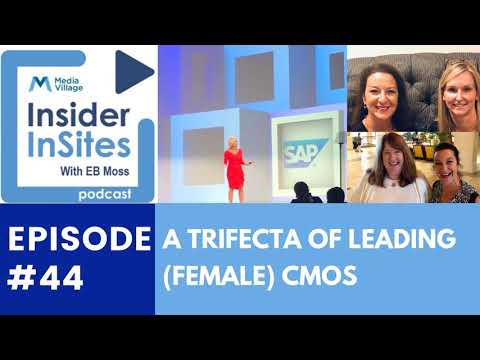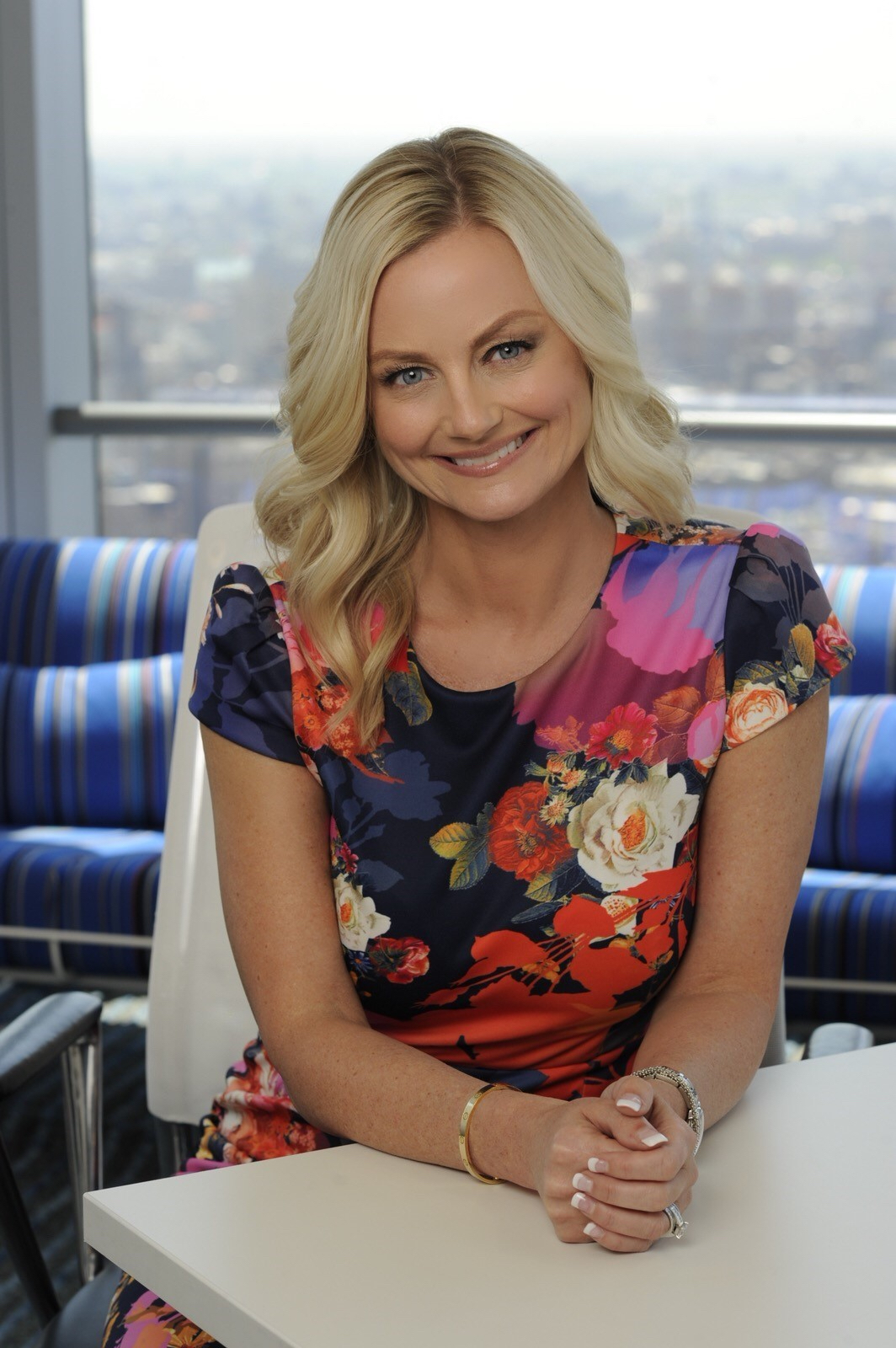Insights From a Trifecta of (Female) CMOs -- Part 1: Alicia Tillman – SAP

I had the good fortune to spontaneously interview one of the keynoters, Eric Reynolds, then chief marketing officer of The Clorox Company, at the ANA's Masters of Marketing conference last year. I thought it would be interesting to speak with the new chief marketing officer (CMO) — Reynolds was recently appointed executive vice president — to get an update at this year's event.
As it turns out, the new CMO is a woman — one of the many speaking at or attending the conference. Reflective of its remit to be more gender-balanced, ANA was successful in drawing female senior marketers to this year's Masters of Marketing confluence. While not quite yet an embarrassment of riches, it did give me the opportunity to make this episode of Insider InSites a curation of three great leaders across tech, media, and CPG, who happen to be female chief marketing officers. Each is impressive in her own right, with tremendous takeaways to share. But the added layer they offered was advice on how to achieve these heights while — reminiscent of Bob Thaves' quote on Ginger Rogers dancing with Fred Astaire — moving "backward and in high heels."
In this three-part companion topline to the one podcast (which you can listen to in its entirety here), you'll first hear from SAP's Alicia Tillman (pictured below), cited by Forbes in 2019 as the world's 14th most influential CMO — and who keynoted at the conference; next, our Clorox Company legend for this year, Stacey Grier; and, finally, Alysia Borsa, who upped the ante as CDMO (chief marketing and data officer), speaking on the marriage of data and marketing for Meredith Corporation.
The following has been edited for clarity and length. Subscribe to MediaVillage's Insider InSites (just named a top podcast for digital advertising professionals!) everywhere: Stitcher, Spotify, iHeartRadio, GooglePodcasts, Apple, TuneIn... and YouTube.
 Talking with SAP's Alicia Tillman
Talking with SAP's Alicia Tillman
To get a sense of the breadth of her role, know that Alicia Tillman heads marketing for what is the largest enterprise software company in the world. In my last episode of Insider InSites, Sir Martin Sorrell included SAP among the tech companies one should watch and study. In operations for 47 years, it is predominantly B2B-focused, has more than 480,000 customers across 180 countries, produces nearly $30 billion in revenue annually, and employs about 100,000 people. Tillman summed up SAP's service as "creating technology to help companies operate at their best, [by supporting] any aspect of a business's operations, [including] enterprise resource planning, financial planning, travel and expense management, human capital management..., procurement systems, and networks...."
Tillman spent 11 years at American Express, responsible for marketing for the travel services business. "I always say that I learned to be a marketer at the best marketing organization on the planet," she says. "I then ran marketing for one of the brands in SAP for two and a half years. And then, I was asked to become the CMO of all of SAP, which was the most exciting day in my career." With a multitude of products in the portfolio and a lot of buyers to target — from the CIO to the CFO to the CHRO — her role as the chief marketing officer focuses on how to organize their story and make it relevant to those vastly different buying groups.
The overarching message is of "how our technology helps companies be more efficient operationally," Tillman explains, "but then to also showcase customers that have true success stories with our technology in solving problems, in the economy, and society, or in the environment.... And the reality is, regardless of what business you're in, people want to buy from companies that feel they have a sense of responsibility to improve something in the world.... So it's less about the features and functions of the products, which once was a way that we marketed, but now it's about value creation and it's about making a difference."
Moss: It seems you're marketing the experience of helping improve and streamlining your business and that's the experience, so to speak, that you want SAP to convey. You also speak about experience marketing?
Tillman: We live in an experience economy. As I shared in my keynote presentation, human beings experience 27 different kinds of feelings, and these feelings play a significant role in decisions we make as it relates to buying…. If we're happy and [a] brand is delivering us an exceptional experience, we're going to keep going back to it....
The types of data that we've had for our customers [are] operational, transactional, financial, behavioral, but we've introduced a new form of data this year through our acquisition of a company called Qualtrics... [which] unlocks "experiential data." Through surveying technology, social sentiment understanding, and compiling this all together [into] a central database, we're able to anticipate the experiences your customers want because they're telling you.
With this experiential data, think about how much more companies can actually claim to be customer-first because we're now taking direct data and saying, "Hey, tell me what type of experience do you expect from this brand?"
Moss: Do you find any certain marketing channels or tactics more conducive to communicating any of those 27 feelings or experiences?
Tillman: As marketers, we often talk about the benefits of both traditional and modern forms of marketing. I think we live in an environment today, though, where feedback loops [and] social listening platforms, are more relevant than ever. Because the reality is, if you look at the data, 80 percent of CEOs believe that they are delivering an exceptional experience to their customers, yet only 8 percent of their customers agree. That's what we call an experience gap.
And when you look at how you would measure that experience gap, it's a $40 billion addressable market.… If we have an ability to create technologies to help narrow that gap, [to help marketers] understand how to drive [an] exceptional customer experience … [that's] what winning in this experience economy is all about.
Moss: What advice would you give others coming up in the world of marketing or just in this crazy media world we're in today?
Tillman: First and foremost is know your authentic self. We talk a lot about building your personal brand and authenticity is really at the core of that. I always say, "Know what you're good at and focus on that." As women, we often like to spend the time focused on the areas that we're not good at and we lead with that, "Oh, I can't do this because...," or "I'm not going to speak about this because...," or "I'm not good enough because...."
We need to switch the dialogue: "I'm going to go for this because...," or "I feel I deserve that because...." Sure, there are things that everybody needs to work on, but we need to stop leading with that and lead with where we know we're good and let that shine.
…Seek the feedback from others, especially your close network because they'll say, "Hey, you're awesome at this and you don't think you are, but I think you are, and you need to be more confident around that."
Moss: Those are great suggestions. Of course, it can be a little scary to ask for feedback....
Tillman: It is scary. And, you know, the world is often about having thick skin. I always remember the example of American Express' longtime CEO, Ken Chenault: besides being super smart, he always asked for feedback, at every turn, every project, good, bad, or indifferent. Feedback not only helps you personally, but it also helps the other person believe more in you because you care enough to ask for their feedback. And you have to realize you are not the only person accountable for your success.
Moss: Interesting that things on our personal level can be applied to the macro-level because that's how companies also need to exact trust: by being genuine, by receiving feedback, by engaging with their actual customers. Now, with 2020 on the horizon, what do you think is going to change the most and how are you going to corral what's new in marketing?
Tillman: I think the number one priority of companies — and that, therefore, will then become a big focus for marketers — is how to better shape the customer experience that brands deliver; [it's] an economy where business is won or lost based on the quality of the experience you deliver. It's very easy for customers to shift to another brand that has equal, if not greater, products that can delight them more effectively.
Two other things that I think are going to be front-of-mind for marketers: the continuously evolving role of the marketing organization within a company is going to continue, [especially with] the evolving nature of technology and emphasis on customer experience. Yet, I think the value of marketing is often not being recognized at the level that it needs to be. We, as marketers, have to continuously evolve and do an excellent job in describing and aligning our value, and then measuring that value for our company.
Finally, I think, as companies, we need to have a continued focus on how we shape the purpose narrative of our brands . What is it that our business helps to enable at a much higher level for our customers? What is the purpose that we have as brands? How do we focus on things that truly matter to people, such as women in leadership positions or other topics of inclusion and why that matters within companies? It matters to employees when they choose brands they want to work for, and it matters to consumers when they're choosing brands they want to buy from. So, I think that will be a continued priority as we look out into 2020.
Click the social buttons to share this story with your friends and colleagues.
The opinions and points of view expressed in this content are exclusively the views of the author and/or subject(s) and do not necessarily represent the views of MediaVillage.com/MyersBizNet, Inc. management or associated writers.


